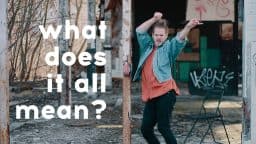Empty streets, some caution tape here and there. A girl that holds her step when a guy passes her. A shop window with a lonesome flickering light. A city fox.
Images from Amsterdam? Berlin? Paris?
No, from Riga, the capital of Latvia. But it doesn’t matter where they are filmed: the whole world recognises them.
Habituation and identification
It’s the images that have been collected these weeks by the Latvian filmmaker Ivars Zviedris. His documentary about COVID-19-times will premiere next year, but singer Lauris Reiniks got to use the first footage for his new song. When you see them there’s a shock of habituation and of identification. Habituation, because: this is how we have been living for weeks now. Identification, because: this is how the whole world has been living for weeks now. After watching this clip we realise: Riga is Amsterdam. Riga is Paris. Riga is Berlin.
Lauris Reiniks
For over twenty years Reiniks has been one of the most loved artists in Latvia. As one of the members of the group F.L.Y. he participated at the Eurovision Song Contest of 2003, with the song Hello from Mars.
His local Eurovision history is more elaborate. He sang four more times at Latvia’s national selections:
2001 – alongside Linda Leen – I wish I knew (2nd)
2002 – My memory tape (5th)
2010 – Your morning lullaby (4th)
2011 – Banjo Laura (2nd).
He also wrote the song I wish I could pretend, that came second in Ireland’s preselection in 2009.
Wider
But for Reiniks Eurovision is just one brush stroke out of a wider painting. There were many national hits, most of which he also recorded in Estonian and Lithuanian (and subsequently scored with in those countries as well), he won Dancing with the stars (2007), hosted all kinds of shows and pursues a prosperous acting career. Fun fact: in 2012 he even recorded a Dutch version of his song Pasakā – as a duet with Renée van Wegberg (see at the right).
Janitor
Jumping to 2020: just before the corona crisis a handyman shows up at Reiniks’ house. Something in the bathroom needs to be fixed. This elderly janitor, of Russian descent, takes to work, while Reiniks is jamming on his keyboard in the livingroom. At a certain moment the janitor suddenly walks into the room, saying, in his thick accent: ‘What a sad and beautiful melody that is, thank you very much’ and leaves again. Reiniks: ‘At that moment I thought: that’s a great first reaction, maybe I should finish this.’
Lyrics
The sad, beautiful melody becomes Dīvaini mierīgi, translated: ‘Strangely peaceful’. Reiniks’ Latvian texts used to be written by Mārtiņš Freimanis, one of the other members of F.L.Y. After him dying in 2011 at the age of 33, several other collaborations followed, but the lyrics for Dīvaini mierīgi are provided by Gatis Mūrnieks, a young singer/songwriter, who grew up with Freimanis’ and Reiniks’ music. He approached the singer, asking whether he could write something for him. ‘Send me a sample,’ Reiniks said. That’s what Mūrnieks did. And? ‘It was perfect. I merely changed two words. He really gets my music.’
Strangely quiet
This is the chorus:
‘Days are flying by strangely, quietly.
I’m drawing you on the white walls.
In this strange quietness I count the hours.
I’m waiting just for you, for you.
Again.
Here.’
Reiniks: ‘We are not directly talking abot COVID here, but the connection is obvious.’
Indeed. Because of confinement and lockdown all kinds of people that love each other have been separated – parents, grandparents, lovers. And this ‘strange quietness’- yes, we have all experienced it.
Cello
In Dīvaini mierīgi this quietness is maybe portrayed best by the cello player we see halfway the clip. He will also be one of the focuses of the documentary, next year. As a classical trained musician, who chooses to play in the streets, he continues to do so in these months – but there’s no one out to listen to him. But it’s his perseverance that makes one thing audible in particular: the dīvaini mierīgi, the strange, strange 2020-silence that sank into all of our streets, into all of our cities.





